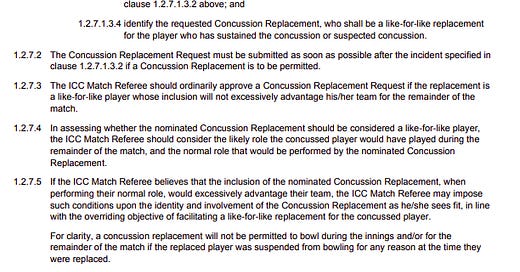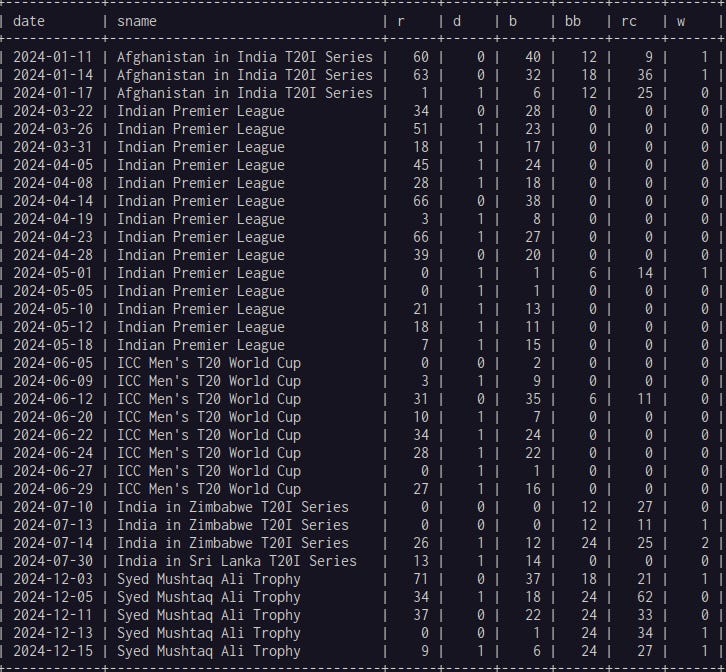India used Harshit Rana as a concussion substitute for Shivam Dube in the 4th T20 International against England in Pune yesterday. The rule requires that the concussion substitute and player being substituted should be “like-for-like” players (1.2.7.3). While determining whether or not the player is a like-for-like player, the referee is required to consider “the likely role the concussed player would have played during the remainder of the match” (1.2.7.4). The rule requires the referee to make sure that the substitute will not “excessively advantage his/her team”. Finally, the rule allows the referee to impose conditions on the use of the substitute to limit such a perceived advantage.
Only Shivam Dube’s bowling role was relevant as the batting innings was over by the time the concussion substitution was requested. The blow which caused the concussion occured on the 5th ball of the 20th over of India’s batting innings.
Harshit Rana, is a fast medium new ball bowler. Shivam Dube is a medium pacer who has 53 first class wickets (at 22 apiece) to his name in 21 first class fixtures, mostly for Mumbai.
The question is whether substituting Rana for Dube excessively advantaged Rana’s team. Its the sort of the lethal question where the temptation to presume (or just outright say) that the Match Referee must have been either bent or incompetent is very great. This presumption has been made liberally, though rarely explicitly, and usually with a wink and a snigger. The social media are awash with the resulting spittle.
I’m going to proceed here by assuming that Javagal Srinath, who has been an ICC Match Referee since 2006 and has officiated 79 Tests, 271 ODIs and 135 T20Is (and 485 ICC run matches in all), is not only highly experienced when it comes to working with the regulations as they are issued and updated, but acts in good faith, and with great competence.
The question is, why might Srinath have approved India’s request to use Harshit Rana as a concussion substitute for Shivam Dube?
At the start of this match, both Dube and Rana conceded 8.9 an over in the T20 matches (T20 and T20I).
Dube did not bowl at all in the 2024 IPL or the 2024 T20 World Cup. But since July 2024, he has bowled regularly, both for India and for Mumbai in the domestic T20 tournament. He has bowled his full quota in four out of five matches in the SMAT tournament in December 2024.
Dube typically bowls in T20 after the powerplay - 52 of his 59 overs in T20 cricket have been delivered after the powerplay. Before this match, Harshit Rana had bowled 20 over his 36 during the powerplay.
I haven’t seen the reporting since the match ended, but I suspect that Srinath agreed to allow India to use Harshit Rana as a concussion substitute for Shivam Dube in the bowling innings provided Rana did not bowl in the first half of the innings. This stipulation would be reasonable since that’s when Dube would have bowled, had he bowled. Rana was first used in the 12th over of England’s chase.
Did Rana provide an advantage over Dube? Probably. But this is permitted in the rules. The question is whether he provided an excessive advantage. The rule is written to prohibit an excessive advantage. The implication is that it is inevitable that in some cases, there will be some advantage gained from the substitute player. Or at least, that it is unlikely to be possible to have like-for-like replacements which are exactly equal to the player they are replacing.
To answer this, consider the following hypothetical: Would Hardik Pandya have provided an excessive advantage over Shivam Dube as a concussion substitute in a bowling innings? Would Mitchell Marsh in a bowling innings?
It is tempting to think that “like-for-like” is a reference to style and not quality. But I suspect that if IND used Shami or Bumrah in place of Dube (both Shami and Bumrah have career T20 economy rates which are much better than Dube’s, in Bumrah’s case, not only is it much better than Dube, but it is also much better than Shami), Srinath would not have permitted it, even with a restriction on when the substitute could be used in the innings. “Like-for-like” is also not strictly about style. England have used Matt Parkinson (a leg spinner) as a concussion substitute for Jack Leach (an orthodox finger spinner). India have similarly used Yuzvendra Chahal for Ravindra Jadeja. Both were permitted.
Allowing Harshit Rana to replace Shivam Dube is, on balance, not unreasonable. India obviously wanted the best replacement they could get. The rule allows the replacement to provide some advantage, just not excessive advantage. Replacing a medium pacer with a medium-fast bowler on debut for a bowling innings when both have nearly identical T20 career economy rates so far, is not excessive is it? It is squarely within the rule. The rule is written to protect the player who has suffered a blow to the head and is considered to be at risk for concussion (note that the rule specifies “a concussion or suspected concussion”) without turning it into a 10 v 11 match. The referee is given discretion to bring about this outcome. Any reasonable evaluation of the Referee’s decision should not lose sight of the fact that the referee has discretion within the restrictions specified above (the full rule is attached at the end of this post).
Rana got 3 wickets on the day. That’s part of the reason for the controversy. If he had collected 0/35 and England had won in 19 overs, then perhaps it would not have mattered. But that cannot be the Match Referee’s problem.
Sadly in situations like this, appearances usually matter more than the details. The details are usually more interesting. They usually show, rather inconveniently, that the people charged with making decisions are not idiots.






To cut a long story short it’s called cheating.
Well written. People making decisions do so in a situation that is not perfect nor do they have the benefit of hindsight. To question them with a barely concealed attitude of “how stupid can this referee be”, or that “the referee is biased, obviously” or “Big Brother BCCI is at it”, etc., shows the questioner in bad light. (Eg. Michael Vaughan!).
That said, the match was in England’s grasp. Why they lost from that position is the more important issue they need to address.